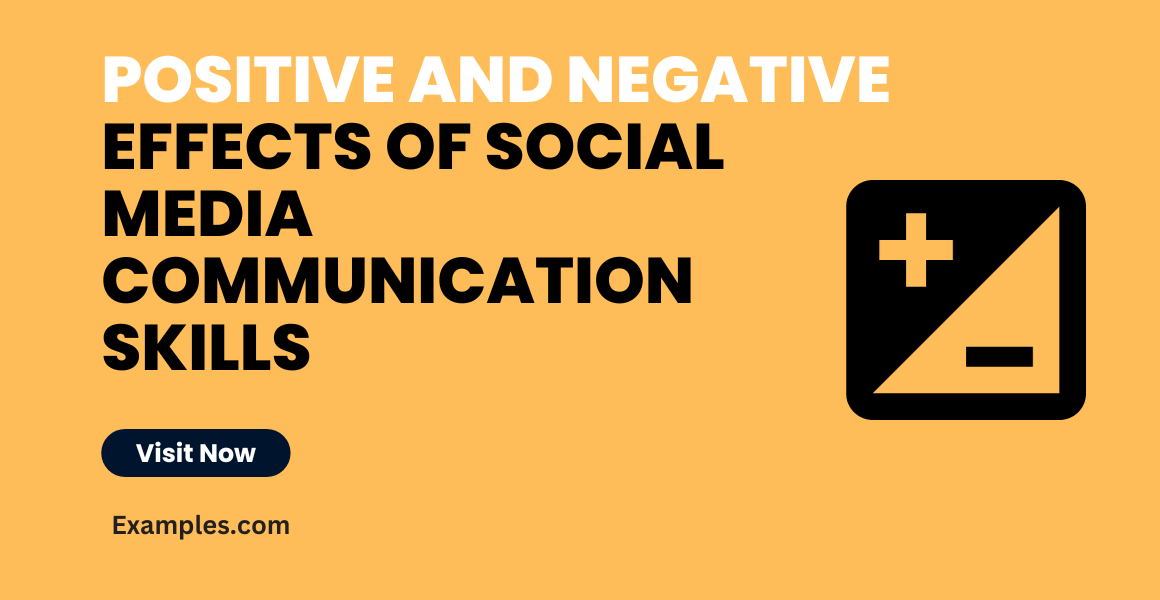10+ Positive and Negative Effects of Social Media Communication Skills
In today’s digital era, understanding the positive and negative effects of social media on communication skills is crucial. This comprehensive guide delves into how social media platforms influence our daily interactions, offering real-world communication examples. From enhancing global connectivity to potentially hindering face-to-face interactions, we explore the multifaceted impact of social media. Whether you’re a student, professional, or casual user, this guide provides valuable insights into the evolving landscape of digital communication.
Difference Between Positive and Negative Effects of Social Media in Communication Skills
Social media’s influence on communication skills is a topic of growing importance in the digital age. To provide a clear and comprehensive understanding, this guide presents the effects in a tabular format, delineating the positive and negative impacts side by side. This format offers an easy-to-digest overview, highlighting how social media can both enhance and hinder various aspects of communication.
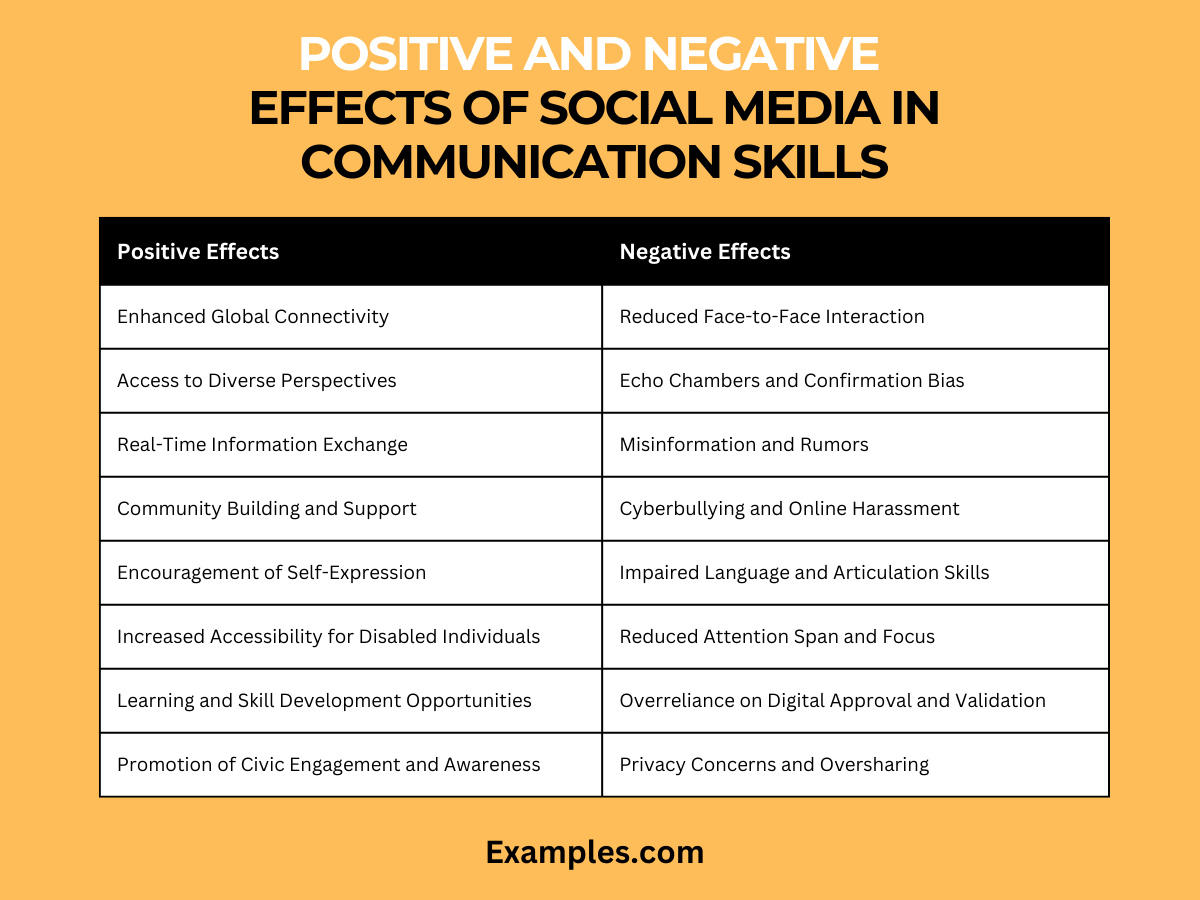
| Positive Effects | Negative Effects |
|---|---|
| Enhanced Global Connectivity | Reduced Face-to-Face Interaction |
| Social media bridges distances, allowing for real-time communication across the globe, fostering cross-cultural interactions and understanding. | Overreliance on digital communication can lead to diminished in-person social skills and a reliance on screen-based interaction. |
| Access to Diverse Perspectives | Echo Chambers and Confirmation Bias |
| Exposure to various viewpoints and cultures can broaden understanding and empathy, enhancing communication inclusivity. | Social media algorithms can create echo chambers, limiting exposure to differing opinions, which can narrow one’s perspective. |
| Real-Time Information Exchange | Misinformation and Rumors |
| Platforms like Twitter enable the rapid dissemination and reception of news and information, keeping users informed. | The spread of unverified information can lead to misunderstandings and the propagation of false news. |
| Community Building and Support | Cyberbullying and Online Harassment |
| Social media fosters the formation of communities based on shared interests, providing platforms for support and collaboration. | The anonymity of social media can sometimes lead to negative behaviors, such as cyberbullying, impacting mental health. |
| Encouragement of Self-Expression | Impaired Language and Articulation Skills |
| Platforms offer creative outlets for self-expression, enhancing individualistic and creative communication styles. | The casual language and abbreviations common in social media can affect formal writing and speaking abilities. |
| Increased Accessibility for Disabled Individuals | Reduced Attention Span and Focus |
| Social media provides accessible communication options for individuals with disabilities, promoting inclusivity. | Constant notifications and the fast-paced nature of social media can lead to shorter attention spans, impacting focused communication. |
| Learning and Skill Development Opportunities | Overreliance on Digital Approval and Validation |
| Educational content and skill-building resources are widely available, facilitating continual learning and development. | Seeking validation through likes and comments can create an unhealthy reliance on digital approval for self-worth. |
| Promotion of Civic Engagement and Awareness | Privacy Concerns and Oversharing |
| Social media can mobilize individuals around social and political causes, fostering a sense of community and civic responsibility. | The culture of oversharing can lead to privacy issues and difficulty in maintaining personal boundaries. |
Positive Effects of Social Media Communication Skills
In the digital age, the positive effects of social media on communication skills are manifold and transformative. This exploration highlights how social media platforms have revolutionized communication, from enhancing global connectivity to fostering creative expression. We delve into specific examples that illustrate these benefits, providing insights into the ways social media can be harnessed to improve communication skills, nurture relationships, and create opportunities for collaboration and learning.
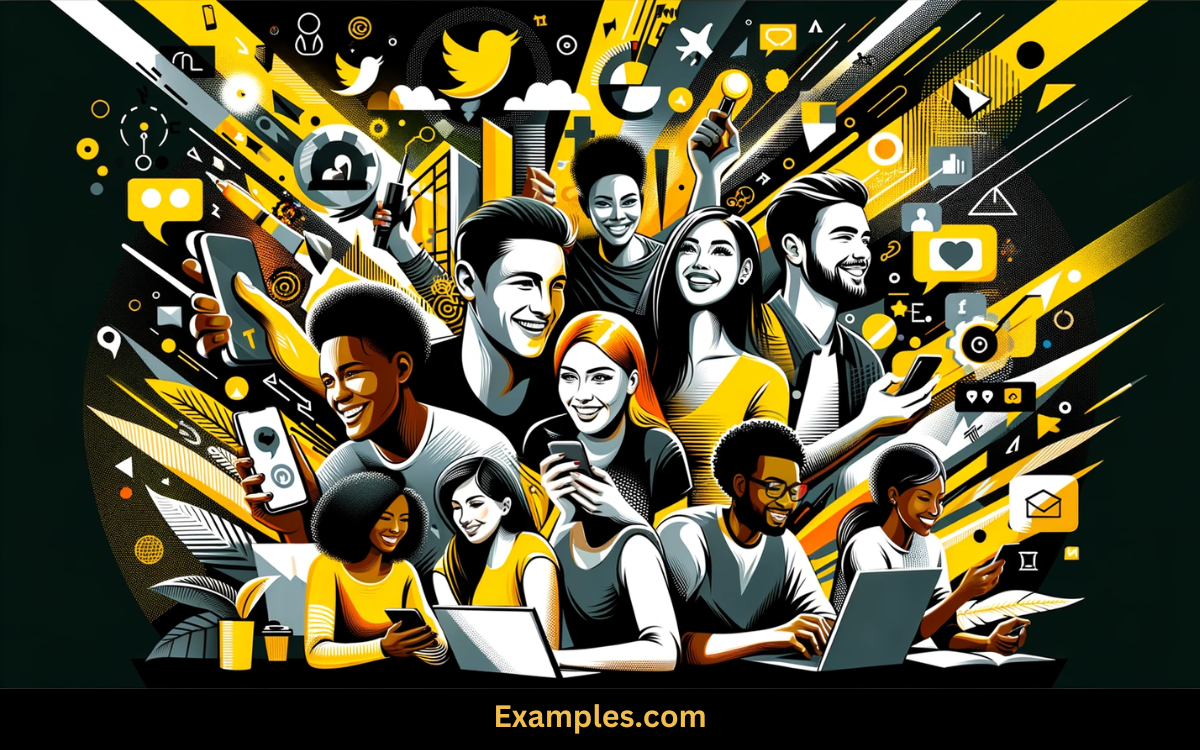
- Fostering Inclusivity and Diversity: Social media breaks down geographical and cultural barriers, promoting inclusivity.
Example: Participating in international online forums can expose you to diverse perspectives and cultures, enriching your worldview. - Enhancing Language Skills: Exposure to various languages and dialects on social media can improve language abilities.
Example: Following multilingual content creators can help in learning new languages or dialects. - Strengthening Community Engagement: Social media allows individuals to engage actively with their local communities.
Example: Using local Facebook groups to organize community clean-up events strengthens neighborhood bonds. - Promoting Educational Content: Many platforms are rich sources of educational material.
Example: Following educational YouTube channels can supplement learning with engaging and informative content. - Encouraging Artistic Collaboration: Artists and creatives often use social media to collaborate on projects.
Example: Instagram collaborations between artists can result in unique and innovative artworks. - Improving Professional Networking: LinkedIn and other platforms facilitate professional connections.
Example: Sharing industry-related content on LinkedIn can attract the attention of potential employers or collaborators. - Developing Digital Literacy: Regular use of social media enhances digital communication skills.
Example: Navigating different platforms can improve your understanding of digital tools and trends. - Facilitating Quick Feedback: Instant feedback on social media can be invaluable for personal and professional growth.
Example: Posting a design draft on social media for immediate feedback can accelerate the creative process. - Enhancing Personal Branding: Individuals can use social media to build and promote their personal brand.
Example: Creating a consistent and professional image on social media can enhance your visibility and credibility in your field. - Increasing Accessibility for Communication: Social media offers various accessible communication methods, like text, video, and audio.
Example: Utilizing social media platforms’ diverse communication tools can aid those with different communication preferences or disabilities.
Negative Effects of Social Media Communication Skills
In the digital age, understanding the negative effects of social media on communication skills is crucial. This section highlights the challenges and drawbacks that social media platforms can pose, such as diminished face-to-face interaction skills, the spread of misinformation, and increased instances of cyberbullying. Each of the following examples illustrates a specific negative impact, providing insights into how these issues manifest and affect our daily communication.
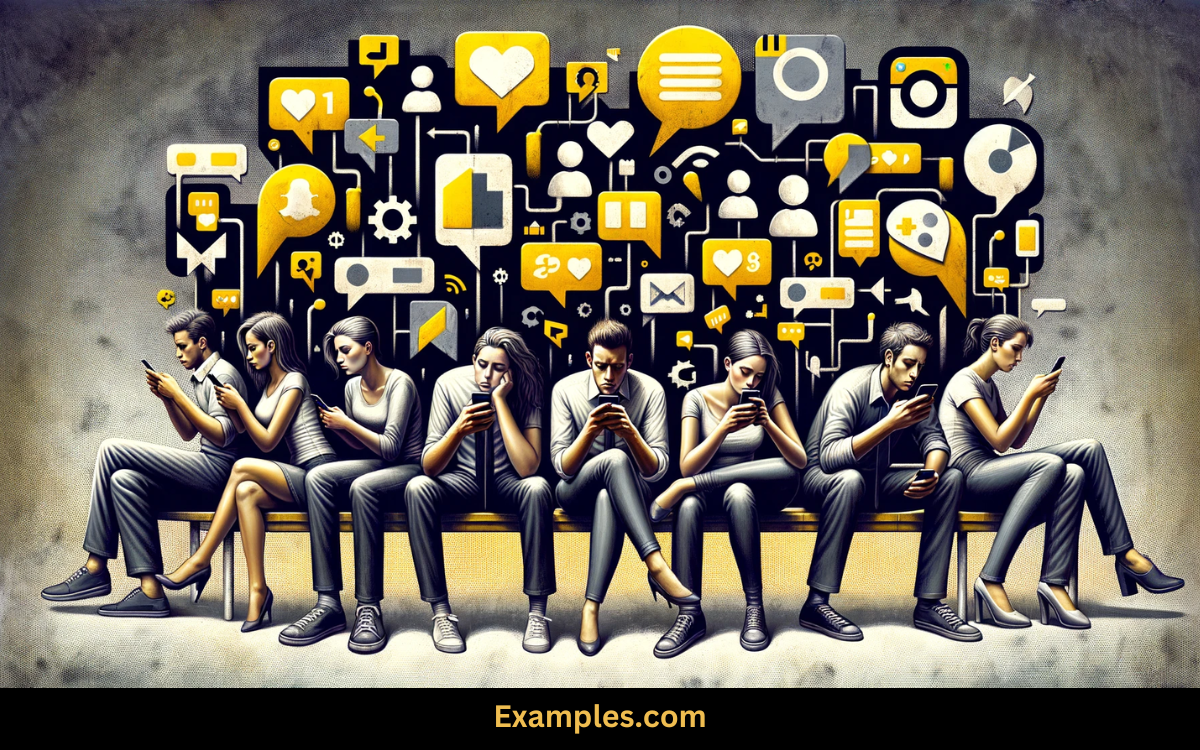
- Erosion of Interpersonal Skills – Example: Relying heavily on texting for communication can lead to discomfort or awkwardness during in-person interactions, as non-verbal cues are often missed.
- Increased Social Isolation – Example: Spending excessive time on social media can lead to feeling isolated from the physical world, as digital interactions replace real-life socializing.
- Misinterpretation of Messages – Example: The absence of tone and body language in texts can lead to misunderstandings, as messages may be interpreted differently than intended.
- Impulse Control Issues – Example: The instant nature of social media can encourage impulsive responses, leading to regrettable or inappropriate comments.
- Reduced Attention Span – Example: Constant social media use can lead to shorter attention spans, making it harder to focus during conversations or meetings.
- Impact on Language Skills – Example: Frequent use of slang or shorthand in digital communication can adversely affect formal writing and speaking skills.
- Overreliance on Digital Approval – Example: Seeking validation through likes and comments can create an unhealthy dependency on digital approval for self-esteem.
- Inability to Handle Criticism – Example: Limited exposure to diverse viewpoints on social media can lead to difficulty in accepting or handling criticism in real life.
- Online Persona vs. Reality – Example: The disparity between one’s online persona and real identity can lead to difficulties in authentic self-expression.
- Privacy Erosion and Oversharing – Example: Habitual oversharing on social media can lead to a disregard for personal privacy and boundaries.
Positive and Negative Effects of Social Media on Children
The impact of social media on children encompasses both positive and negative aspects. While it can be a source of educational content and a platform for developing digital literacy, it also poses risks such as exposure to inappropriate content and cyberbullying. This section explores these dual effects through specific examples, offering insights into how children’s communication skills and overall development are influenced by social media.
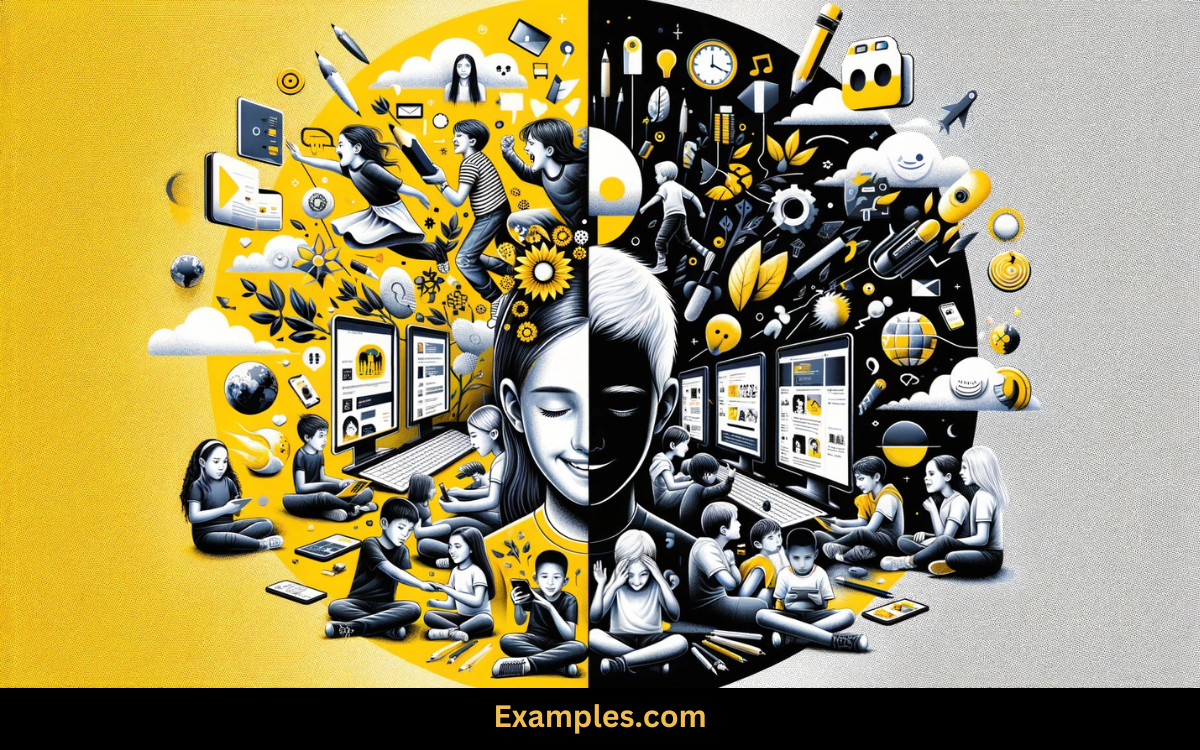
- Positive: Access to Educational Content – Example: Platforms like YouTube can provide children with access to educational videos that enhance learning and creativity.
- Negative: Exposure to Inappropriate Content – Example: Unsupervised use of social media can lead to children encountering harmful or adult content, impacting their development.
- Positive: Enhanced Digital Literacy – Example: Early exposure to social media can help children develop digital skills essential for the modern world.
- Negative: Cyberbullying and Online Harassment – Example: Children on social media can be vulnerable to cyberbullying, affecting their mental health and self-esteem.
- Positive: Social Connection with Peers – Example: Social media can help children connect with friends and peers, especially during times they cannot meet in person.
- Negative: Distraction from Academics – Example: Excessive use of social media can distract children from homework and studies, impacting their academic performance.
- Positive: Development of Creative Expression – Example: Platforms like Instagram or TikTok can encourage children to express themselves creatively through various media forms.
- Negative: Unrealistic Body Image and Self-Perception – Example: Exposure to edited and idealized images can lead to unrealistic body image expectations among children.
- Positive: Encouragement of Civic Engagement – Example: Social media can expose children to social and environmental issues, fostering a sense of civic responsibility.
- Negative: Disrupted Sleep Patterns – Example: Excessive screen time, especially before bedtime, can disrupt children’s sleep patterns, affecting their health and well-being.
How Does Social Media Affect Communication Skills Negatively?
While social media offers numerous benefits, its negative impact on communication skills cannot be overlooked. These impacts are multifaceted, affecting various aspects of how we interact and express ourselves.
- Reduced Face-to-Face Interactions: With the convenience of online communication, there is a tendency to avoid in-person interactions, which are crucial for developing and maintaining strong interpersonal skills.
- Dependency on Digital Communication: Over-reliance on social media for interaction can lead to a degradation of essential communication skills like active listening, empathy, and the ability to read non-verbal cues.
- Erosion of Privacy and Boundaries: The culture of oversharing on social media can blur personal boundaries, leading to difficulties in managing privacy and understanding appropriate sharing levels in different contexts.
- Impulse Control and Aggression: The immediacy and often anonymous nature of social media can lead to impulsive and aggressive communication, which might not occur in face-to-face settings.
- Impact on Language and Articulation: The use of slang, abbreviations, and emoticons prevalent in social media can affect linguistic abilities and the capacity to articulate thoughts coherently and professionally.
- Emotional Health and Communication: The negative emotional impact of social media, such as anxiety and depression due to comparison and cyberbullying, can hinder effective communication and emotional expression.
In conclusion, while social media is a powerful tool for enhancing communication, it is essential to be aware of its potential negative impacts. Balancing online and offline interactions, and using social media mindfully and responsibly, can help mitigate these negative effects, leading to healthier and more effective communication skills.



